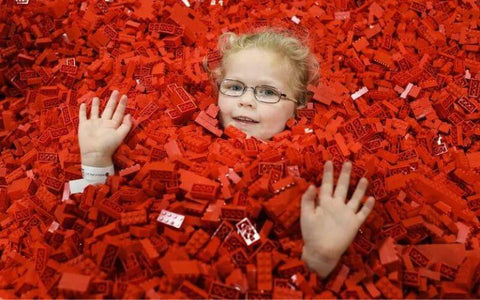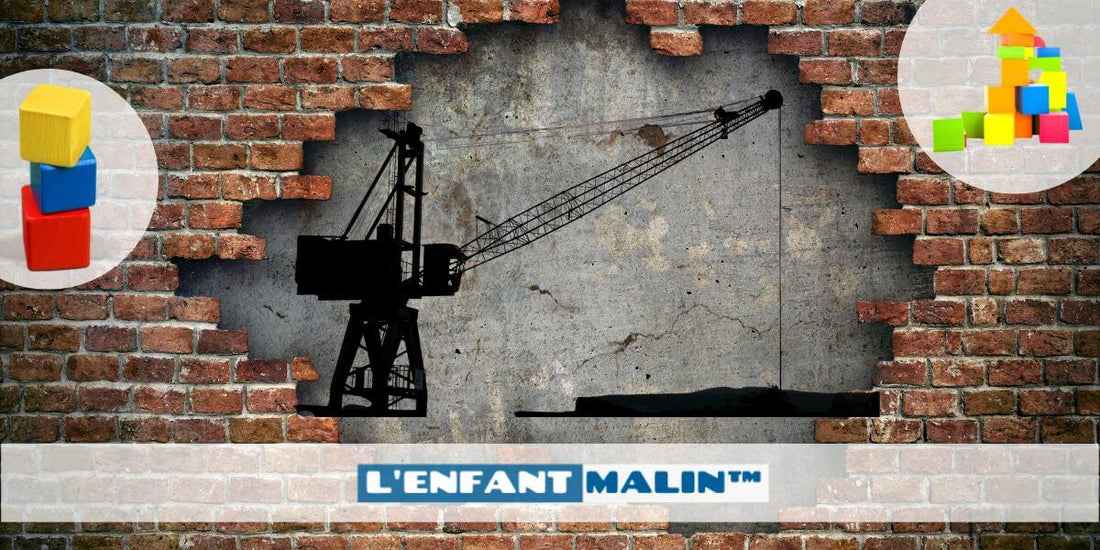Construction games are one of the best-known and most loved educational games today. History was mainly written by 2 visionary giants but the future risks being quite different.
- Where do they come from?
- Why are they so popular?
- A growing diversity
construction sets encourage children's imagination with their multitude of construction possibilities. Simple building blocks allow children of all ages to create castles, towns, buildings and anything else their creative minds can imagine. It's the epitome of educational and fun. These features have made construction sets one of the most loved and well-known toy categories in the toy world. Two toy giants stood out at the beginning of the last century. Let's take a quick look at their story.

(@Canva / Wooden construction games and magnetic pieces)
MECCANO, THE PIONEER OF CONSTRUCTION GAME
Meccano, a brand born from a brilliant idea at the end of the 19th century, to entertain and educate young people around the world. This toy revolutionized toys and construction games in Britain and, ultimately, on different continents.
Meccano is a model building system originally created in 1898 by Frank Hornby in Liverpool. The system consists of reusable metal strips, plates, angles, wheels, axles and gears and plastic parts that are assembled using nuts, bolts and grub screws. In 1902 he began calling these toys "Mechanics Made Easy" and sold them in sets with parts supplied by external Liverpool companies.
(@ Canva / Meccano construction game)
In 1907, Hornby changed the name to Meccano, which he thought would be shorter and more practical, and established his first factory. He established Meccano Ltd. in 1908 to manufacture and distribute Meccano and other toys and model kits. In the 1920s and 1930s, Meccano Ltd. became the UK's largest toy manufacturer and produced three of the most popular toy lines of the twentieth century: Meccano, Hornby trains and Dinky toys.
Hornby also launched Meccano magazine in 1916, publishing the first issue in black and white. The magazine tells the story of Meccano's beginnings, written by Frank Hornby himself. It was launched to promote toys and increase sales. From 1920, the Meccano Magazine covered many subjects such as mechanics and Meccano construction, but also planes, trains, the navy, engineering, collectible stamps and photography.
 (@ New Modellers Shop / Hornby Train Sets | Electric Model Railway Train Sets)
(@ New Modellers Shop / Hornby Train Sets | Electric Model Railway Train Sets)
All these efforts have helped strengthen Meccano's growing fan base and attract new members.
A similar construction game was introduced in the United States in 1913 under the Erector brand. In 2000, Meccano bought the Erector brand and unified its presence on all continents. Meccano has passed through different French, American and Japanese owners over the past five decades. Production is now based at a factory in Calais, France, which was established by the original British company in 1959.
To be marketed to children of this era, modern kits were updated to include radio control, robotics, sound and lights.
And in 2017, Meccano Micronoids (mini-robots) were finalists for the Toy Industry Association's Toy of the Year award.
LEGO THE WORLD-KNOWN LEADER
- The beginnings
The company that makes these famous interlocking bricks started as a small shop in Billund, Denmark. The company was established in 1932 by master carpenter Ole Kirk Christiansen, assisted by his 12-year-old son Godtfred Kirk Christiansen. She made wooden toys and stepladders. It was only two years later that the company took the name Lego, which comes from the Danish words "LEg GOdt", meaning "play well".
In 1947, the company made a huge purchase that would transform it and make it famous throughout the world. That year, he purchased a plastic injection molding machine, which could mass produce plastic toys. In 1949, Lego manufactured self-attaching bricks which were the predecessors of the toys we know today.
- Birth of the Lego brick
In 1953, self-fixing bricks were renamed Lego bricks and became increasingly colorful. In 1957, the principle of interlocking bricks was born, and in 1958, the dowel and coupling system was patented, which added great stability to the constructed pieces. This is how they became the bricks that children use today.
 (@ Canva / Classic Lego Cube)
(@ Canva / Classic Lego Cube)
In the early 1960s, Lego went international, with sales in Sweden, Switzerland, the United Kingdom, France, Belgium, Germany and Lebanon. Over the next decade, the toys became available in more and more countries, and they arrived in the United States in 1973.
- Lego games
In 1964, for the first time, consumers could purchase Lego sets. In 1969, the Duplo Color Series – larger block designs for smaller hands – was introduced for children under 5 years old. Lego then introducedthematic lines(models), includingCity (1978), Castle (1978), Space
In 2018, the group sold 75 billion of its bricks in more than 140 countries. Since the mid-20th century, these little plastic bricks have sparked the imagination of children
WHY ARE THEY SO POPULAR?
It's simple: children have hours of fun when parents are happy and proud to see them learn and progress! Both parts of the equation are therefore solved!

(@ Canva / Assemble colored block constructions - family)
Here are 9 main benefits for children according to some English-speaking experts:
✔ Problem solving:
Sometimes it's intentional: "I want to build X. How do I do it?" Other times, it's in the moment: "To go higher and add to one side, what can I use?" - Peter Pizzolongo
✔ Imagination:
Kids can follow their own plan or share a friend's vision and work together to create something they never dreamed of. - Karen Cairone
 ( @ Canva / Assemble colored wooden constructions)
( @ Canva / Assemble colored wooden constructions)
✔ Mathematics:
Important concepts and skills are practiced and reinforced through block play, including length, measurement, comparison, number, estimation, symmetry, balance. -Kristen Kemple
✔ Continuity and permanence:
The game of cubes appeals to the sense of space and motor skills; it can be an individual or collective effort; Cube creations can remain in place for an indefinite period of time. - Lawrence Balter
✔ Creativity:
Blocks and other loose parts can be moved freely by children, to be combined and recombined in countless ways. - Angela Eckhoff
✔ Science:
Construction games offer the opportunity to test hypotheses and develop scientific reasoning. - Gayle Mindes
✔ Self-esteem:
Children discover that they have ideas and that they can bring their ideas to life by creating, transforming, demolishing and re-creating something unique. - Holly Bohart

(@ Canva / Build to Thrive)
✔ Social and emotional growth:
Blocks help children learn to take turns and share materials, form new friendships, become independent, increase their attention span, cooperate with others and develop self-esteem. - Kathleen Harris
✔ Development in all areas:
The block game uses fine and gross motor skills. Blocks improve children's problem-solving skills, math skills, language and literacy. And building “creations” strengthens self-esteem and the feeling of success. - Linda Taylor
MORE AND MORE INNOVATIVE AND ATTRACTIVE CONSTRUCTION GAMES
We have previously seen the importance of construction and assembly games in the world of toys. They are known in the form of bricks, sticks, blocks or rounds and made of wood, silicone, plastic or even sometimes metal! It is therefore very difficult to make a precise and exhaustive list of all existing construction games!
However, for you parents interested in construction games, we have tried to simplify the task by grouping some of them together. We are sure that you will find the model(s) that best suit your children's expectations and tastes. Good research !
🤴🏻 Magnetic assembly games
Magnetic games and more particularly the magnetic construction game have experienced great growth over the last 20 years.
Magnet-Me™, magnetic game par excellence, it has the particularity of being able to correspond to a 2 year old baby as well as to an older 10 year old child. These magnets allow little ones to discover shapes and colors and older ones to test their creativity and ability to build! Magnetic game that will attract your child for long moments of happiness!
(@ L’Enfant Malin / Magnet-Me™ magnetic game box)
CreaBox™ is not a construction game as is, but it is magnetic, appeals to the child's creativity but also t5> the manipulation this is why we decided to place it in the list. High quality wooden box helping the reproduction capacity and the dexterity of our little ones.
(@ L'Enfant Malin / Magnetic creation box - different themes)
🧠 STEM construction games
Increasingly popular among children but especially favored by parents who wish to introduce their child to “materials and jobs of the future” in science and technology.
(@L'Enfant Malin / Child assembly box)
🧩Variations to classic Lego
The derivatives and improvements of the classic game number in the hundreds and all have their interest and benefits for the child. A multitude of models and shapes that can be made with new generation blocks.
(@ L’Enfant Malin / MyCube™ wooden cube)
🔮 Ball circuits
What if we combined two of the most popular games in history? Lego combined with marbles is what marble construction games offer.
(@ L’Enfant Malin / Construction game collection)
🏗 Model toys
Considered by some as real artistic constructions, models (at least for children) are also part of educational games for children and especially assembly games.
🎄 Wooden construction games
Wood has become very fashionable again over the last 10thres years due to all these benefits, particularly concerning educational games.
To find out more, see our article "Why use wooden toys?
(@ The Smart Child / MonUnivers™ wooden construction game)
👶🏻 Silicone construction games
A new trend that appeared only a few years ago in a more environmental and educational issue. The silicone construction game is very popular, especially for children under 3 years old who have certain special needs (to find out in our article "Which construction game for babies?").
 (@ The Smart Child / Suction Cup Game)
(@ The Smart Child / Suction Cup Game)
But also wonderful silicone cubes for children under 2 years old:

(@ L'Enfant Malin / Baby development construction cube)
To find out more about construction games for 3 year olds read our detailed article here.
Born around the beginning of the 20th century, the construction game of what we know today is the educational game par excellence. Appreciated by children like their parents, a multitude of options are available to them. Lego is therefore no longer the only player in this educational and creative world.






